- Home
- S. Hussain Zaidi
Mafia Queens of Mumbai Page 2
Mafia Queens of Mumbai Read online
Page 2
‘She was also a freedom fighter—she participated in the freedom struggle against the angrez with Mahatma Gandhi.’
My jaw drops. ‘What are you saying? Then how did she become the queen of the underworld?’
‘Because Dawood Ibrahim thought of her as his surrogate mother. Also, she was held in high esteem both by the police and the mafia. She had massive clout with all the gangs.’
I slip another bill into his hand and ask, ‘Where did she live and operate from?’
‘Dongri.’
Dongri is to Mumbai what Palermo is to the Sicilian mafia—at least it was during the Dawood Ibrahim days. And that’s when the last piece of the jigsaw puzzle falls into place for me.
‘Why, is this Jenabai’s grave?’
The old man nods vigorously. ‘Haan haan, this is Jenabai’s grave.’
I’m puzzled: I’ve heard about Jenabai, but only that she was a bootlegger and a police informer. The grave-digger had given me a new perspective on this woman.
I’m intrigued; I have to get her story.
Chapter 2
NIGHTCAP AT
BAITUL SUROOR
A
black Mercedes pulled out of the shed and drove quickly past the small wrought-iron gate of the two-storey villa and onto the winding road. It was June 1980 and the rains had just begun to beat down on the sunbaked city.
Watching the car disappear into the night, he stood there alone, on his balcony. Tense lines creased his forehead. To calm his nerves, he took out a cigarette from the pack of 555 in the pocket of his white kurta. Lighting it, he began to pace the length of the veranda. His villa, the Baitul Suroor, Arabic for ‘house of happiness’, was situated in one of Mumbai’s most expensive areas—Peddar Road.
Finally, over two hours later, seven cigarettes down, he was relieved to see his black Mercedes return and grind to a halt in front of the villa. His driver walked out of the car and opened the back door and an old woman, well in her seventies, stepped out, fidgeting unsteadily with her black umbrella, trying hard to open it, before she got too wet.
Jenabai walked towards the entrance of the villa. The doors had already been left open for her. He hastily stubbed the burning end of his eighth cigarette inside a glass ashtray and rushed downstairs towards the entrance.
He had called her a few hours ago, requesting her to join him for dinner. Hearing the urgency in his voice, she had readily accepted the invitation. His Mercedes had been sent to pick her up from her small home in Dongri at 7 p.m. Passers-by saw her walk out of the building and slip into the car. When she sat in the backseat, the driver exchanged a warm, familiar ‘salaam’ and then proceeded to drive past the rickety old buildings towards Peddar Road. It had been raining heavily in Dongri, too; however, unlike Peddar Road, Dongri continued to bustle with activity despite the downpour. Protected by blue and black plastic sheets, stalls continued their business as salesmen engaged in their daily routine of drawing customers and selling goods.
The Mercedes stood out in this environment, but Dongri locals knew who was in the car and where she was going. The reason behind the meeting, however, was still a well-kept secret, meant to stay inside the closed walls of Baitul Suroor and revealed only to the one woman who was feared and respected by all in Dongri.
Having reached the villa after around an hour, Jenabai felt surprisingly rejuvenated. The off-white villa was sombre in appearance. Intricately-designed white window grills, stone walls and the humble entrance, with clusters of potted plants, gave outsiders no hint of who lived there, or what he did for a living.
When she entered the house, she saw him standing in anticipation. He was dressed in a white kurta and pyjama. She shut her wet umbrella and placed it inside the bucket at the entrance.
‘Salaam Aapa,’ he said, referring to her as his elder sister, as he normally did.
‘Salaam.’
Then, from the narrow entrance, he directed her towards the spacious drawing room.
‘Aapa, it is kind of you to have come here at such short notice,’ he said as he led her to one of the sofas.
She gave him a broad smile, although she could sense the discomfort in his voice. She asked for a glass of water and sat back comfortably on the couch, lifting her feet onto the table. He called for someone, who appeared with water in no time. When he had left the room, she said, ‘Bhai, you seem to be very disturbed.’
‘Aapa ...’ he said, and after a long pause continued, ‘I have a massive problem. And, whenever I am in some kind of trouble the only person I can think of is you.’
Jenabai was embarrassed, overwhelmed by the influence she possessed over this one man, one of Mumbai’s most dangerous personalities, Mastan Haider Mirza. A man whose rags-to-riches story had inspired and been depicted on celluloid time and again.
Legend had it that Mastan was originally from Chennai and had come to Mumbai in 1934, along with his father. He had started off as a mechanic, repairing cycles before moving to the Mumbai docks as a coolie in 1944. There his job was to unload huge boxes and containers from ships coming from Aden, Dubai, Hong Kong. In the years to come, he made millions of rupees from smuggling gold, silver ingots and electronic goods and, along with Karim Lala and Vardharajan Mudaliar, went on to form one of the most formidable gangs in Mumbai. His villa, his Mercedes and his tremendous influence, were all off-shoots of the enormous wealth he had hoarded illegally over the years.
Now, here she was, Jenabai, in Mastan’s house, discussing his problems, counselling him ... Jenabai could not have felt more pride in being called his sister.
Chapter 3
THE BEGINNINGS OF
THE SCHEMER
B
orn in the early 1920s to a Muslim Memon Halai family, Zainab, alias Jenabai, was one among six siblings. Her father made ends meet ferrying passengers on Victoria carriages across the city, and the family lived in a one-room tenement on Mohammad Ali Road, Dongri, in Mumbai.
Dongri, a stone’s throw away from the cloth market in Kalbadevi, was initially part of the original island of Mumbai, which stretched from Malabar Hill to the Dongri hills. Mumbai, at the time, was divided into seven islands, which included Colaba, Old Woman Island, Mahim, Parel, Worli and Mazgaon. In the mid-1700s, the Dongri hills were levelled as part of the plan to merge the different islands of Mumbai. After the hills were levelled, the low-lying patch of uneven land between Crawford Market in the north and the reclaimed lands of Kamathipura in the south came to be called Dongri.
Today, Dongri—choc-a-block with rickety, old buildings—falls partially below the gigantic JJ Flyover and is primarily dominated by Muslims.
By late morning, the bazaar in Dongri spills onto the footpaths, selling audio and video tapes of Islamic teachings, attar, henna, chikan kurtas, mojris and jewellery. The bazaar is full of Iranian and Afghani restaurants, bakeries and sweetmeat shops that sell mawa cakes, hot jalebis, kheer and gulab jaamuns. During the late afternoons and evenings, the aroma of hot kebabs, biryani, gosht and kheer permeates Dongri.
The signboards in Urdu, the number of men kneeling down in rows outside the mosques, the women in burqas doing their vegetable shopping—to an outsider, Dongri could seem like another country in itself. Until the mid-1990s, this place was known for all the wrong reasons, venue as it was for endless gang wars and communal bloodshed. But in the early 1920s and ’30s, Dongri was one of the hubs for the independence movement, and both men and women—regardless of their religion—took to the streets for the cause of freedom. Jenabai was one among them. As a young girl, she ardently supported the Gandhian movement and the cause of Independence. Her conservative Muslim background did not deter her from participating in the struggle for freedom, and since she did not go to school, she would spend most of the day in sloganeering.
When she was fourteen, Jenabai was married to Mohammad Shah Darwesh and she moved to the Chunawala building in the same neighbourhood. Darwesh had a small timber business. She bore him five children— Khadija, Iqbal, Sali
m, Kamaal and Shammi. Even after marriage, she continued to participate in the freedom struggle. Her husband would often beat her for protecting Hindus during the communal turmoil triggered by the divide-and-rule policy of the British.
Then, Partition took place in 1947. Muslims and Hindus in the country redistributed themselves in the quest to find a new home after the British re-drew the map of the Indian subcontinent. Darwesh decided to move to Pakistan but Jenabai, who had spent much of her childhood and youth struggling for Independence, refused to leave Mumbai. Her husband refused to give in and moved to Pakistan, leaving her alone to fend for herself and her five children.
She was completely lost and did not know how or where to begin. This was when there was a scarcity of grains in Mumbai. Most of the country’s farmlands had gone to Pakistan, and slowly the middle-classes began to feel the lack of grains and lentils. At the time, the rationing system was prevalent in Mumbai, and the government distributed limited food essentials to ration-card holders. Rice, especially basmati, was the staple diet of the Muslim community, integral in dishes like pulao and biryani. The scarcity of foodgrain, lentils and wheat forced many to buy smuggled grain.
In the 1940s, the major wholesale grain market in Mumbai was Daana Bazaar at Masjid Bunder, close to Dongri. In need of quick money to sustain her family, Jenabai started working as a broker for smuggled grain, playing intermediary to wholesalers and dealers of lentils, pulses, sugar and basmati rice. Jenabai would procure foodgrain in bulk from the wholesalers at Daana Bazaar on a commission, and then sell this grain to dealers who would sell it for a higher price and give her a margin of the profits. She also sold grain to people who lived with her in the tenement. Hoarding and trading in grain without a licence was illegal and punishable by law. The police raided Jenabai’s room at Chunawala building several times but never managed to get enough evidence to book her.
Since she was a Memon, she was also fluent in Gujarati, making it easier for her to interact with the wholesalers and traders, most of whom belonged to the Gujarati community. These Gujarati traders soon began to refer to her as ‘sister’ or Jenaben. Since her dealings were mostly in rice (chaaval), the title ‘Chaavalwaali’ (one who deals in rice) became suffixed to her name, and locals in Dongri and Daana Bazaar began calling her Jenabai Chaavalwaali.
Chapter 4
AT THE DINNER TABLE
M
astan hadn’t said a word for several minutes. Jenabai didn’t push him. Quietly, she sipped the last of her ginger tea—her third cup—from the saucer.
Suddenly, his face tense, he said, ‘I need help Aapa, this is very important for me.’
Bringing her feet down from the glass table, Jenabai lifted herself from the couch. ‘Bhai, what is the matter .., I have been sitting here for such a long time,’ she said, pushing her feet into her gold-heeled sandals.
‘Let’s talk about it over food,’ he said.
Her white chikan kurta had creased slightly, and the dupatta that covered her reddish-brown mehendi-dyed hair had shifted position. She tidied her kurta, straightened her dupatta and walked towards the mahogany dining table. She had a regal air about her, her ears glinting with diamond-studded earrings and her hands heavy with the weight of gold bangles.
The dining table was laden with food, from mutton korma and pulao, kebabs to murg musalam. Mastan sat across the dining table from Jenabai. The domestic help started serving her, looking at her intermittently to check if she wanted more. She nodded.
The help obliged her and then went towards Mastan with a bowl of pulao. Mastan shook his head. ‘Not now,’ he said.
‘You won’t eat?’ she asked.
‘I prefer cigarettes for now,’ he replied.
As she began to eat, he started to speak slowly, forming each of his sentences in his head before he voiced them aloud.
‘Aapa, I want to leave this illegal business.’
‘Why?’ she asked, surprised.
‘I have spent most of the last few years either behind bars or making endless rounds of the court. Narayan bhai (Janata Party leader Jaiprakash Narayan) helped in my release only after I promised him that I would become clean,’ he said. ‘I have been contemplating doing something else for a long time but nothing has worked in my favour.’
Jenabai heard him out patiently.
The last six to seven years had been very difficult for Mastan. First, in 1974, he had been detained under the Maintenance of Internal Security Act (MISA) for ninety days. Following this, the government arrested Mastan under the Conservation of Foreign Exchange and Prevention of Smuggling Act. Then, during the Emergency in 1977, he, along with other gangsters like Karim Lala, was once again tried under MISA. In fact, Jenabai had also been jailed under MISA; however, the charges against her could not be proved.
MISA was a controversial law that was originally passed by the Indian Parliament in 1971, during the administration of Prime Minister Indira Gandhi. Indira Gandhi had introduced the Act with the main objective of providing law enforcement agencies with powers of indefinite ‘preventive’ detention of individuals, search and seizure of property without warrants. Despite hiring the best criminal lawyers like Ram Jethmalani, Mastan languished behind bars during the entire Emergency. He realised that he no longer wielded the influence that he had enjoyed in Mumbai as a smuggler. Also, the endless legal battles had pushed him into debt.
When the Emergency was lifted and the Janata Party came to power in 1979, Mastan pleaded with Jaiprakash Narayan to intervene with the then prime minister, Morarji Desai, to show compassion towards him. Mastan had filed affidavits and under oath, sworn to the government that he would try to turn over a new leaf. His plea was accepted and he was finally released from detention.
‘I am sinking in a sea of debt, Aapa ... I have to repay loans, my house has been mortgaged. The only possible business ventures where I can now invest money are real estate or the movies,’ Mastan said.
‘There are a lot of risks in investing money in movies,’ Jenabai said, but her thoughts lingered on the memory of this man that had been embedded in her mind several years ago. She remembered how much in awe of him she had been when she was first introduced to him by the Mumbai-based Tamilian don Vardharajan Mudaliar. He had been so much braver then, so much larger than life ...
Chapter 5
FROM CHAAVALWALI TO
DAARUWALI
P
rohibition had always been central to Mahatma Gandhi’s and the Congress’ agenda. Hence, on 1 August 1939, two years after the first Congress ministry was created in the Bombay province, prohibition was introduced in the city. However, law-enforcers faced problems in the very first week of implementing it. For one whole week, there were clashes between groups for and against prohibition.
The home minister at the time, Barrister K.M. Munshi, carried out an intensive recruitment programme in the police force to implement the Prohibition Act effectively. An exclusive cadre called the X Division was created and was headed by a DCP, Prohibition. New sub-inspectors were also trained for special prohibition duty, and men from the Excise Department were brought into the city police department.
However, when the Second World War broke out in 1939, the mammoth prohibition force was diverted for security measures to the docks and the implementation of prohibition suffered.
In 1946, after the Nazis were defeated, the Congress government came back to power and prohibition was imposed on Mumbai again. Veteran politician and then chief minister of the Bombay province Morarji Desai, who was staunchly against the selling and consumption of alcohol, declared complete prohibition in liquor sales in Bombay from 6 April 1950, by passing the Bombay Prohibition Act of 1949. Before this order fell into place, the Christian and Koli communities distilled their own liquor, like jambul, jira, moha etc., while most of the other alcohol available was imported from the West, particularly England.
Unfortunately, prohibition did nothing but sow the seeds for bigger crimes in Mumbai, opening the gateway
for bootleggers and smugglers. Apart from these, a number of ‘aunty joints’ also sprung up to quench the thirst of the alcohol-deprived population. Poor Goan Christian women brewed liquor in their backyards and kitchen, and sold it discreetly for a good price. Since their patrons found it difficult to pronounce their names, they were nicknamed according to their physical attributes like Gori Aunty, Chikni Aunty and Baidewali Aunty. Bootlegging was seen as a most lucrative businesses with profits running into thousands of rupees, and these aunty joints soon went on to become part of the Mumbai culture.
It was during this time that Jenabai Chaavalwali remarried an already married Iqbal Gandhi. She was still illegally dealing in grain but the profits were marginal and she was tired of making minuscule amounts. That was when she met Tamilian don Vardharajan Muniswami Mudaliar.
One evening, JenabaI—like several other ardent devotees—had gone to visit the 260-year-old shrine of Bismillah Shah Baba at the Chhatrapati Shivaji Terminus. When she was about to leave, she saw a burly, dark man, in his mid-thirties distributing niyaz, sacred food, to devotees in the dargah. Jenabai had heard a lot about the benevolence of this man from her neighbours in Dongri. Though he was a Hindu, his generosity at the dargah had been spoken of. She decided to stay back and meet this man, on the pretext of taking her share of niyaz before leaving.
After the man completed his rounds, he sat for some time outside the shrine, chatting with the regulars and acquaintances. Jenabai approached him and began crying about her financial situation, and how she was struggling to make ends meet. ‘I want you to help me, Bhai,’ she pleaded. ‘My husband does not work. Feeding my children and looking after the household is solely my responsibility ... I tried my hands in the grain business for a few years but I could not earn enough. I really don’t know what to do. You are a big man, everyone respects you ... if you could give me a small job, God will bless you.’

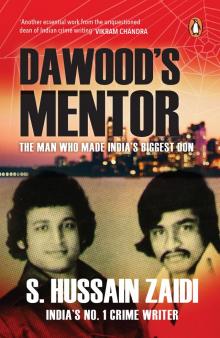 Dawood's Mentor
Dawood's Mentor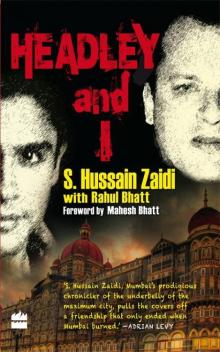 HEADLEY AND I
HEADLEY AND I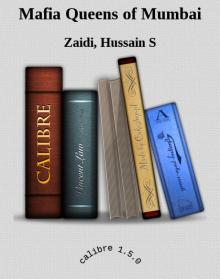 Mafia Queens of Mumbai
Mafia Queens of Mumbai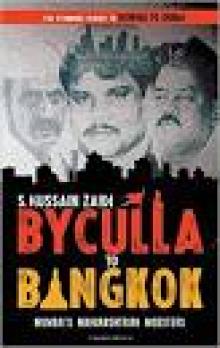 Byculla to Bangkok
Byculla to Bangkok Black Friday
Black Friday The Endgame
The Endgame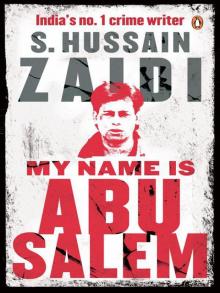 My Name is Abu Salem
My Name is Abu Salem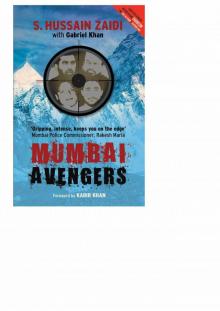 Mumbai Avengers
Mumbai Avengers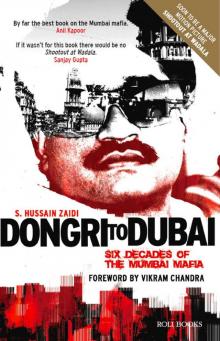 Dongri to Dubai - Six Decades of the Mumbai Mafia
Dongri to Dubai - Six Decades of the Mumbai Mafia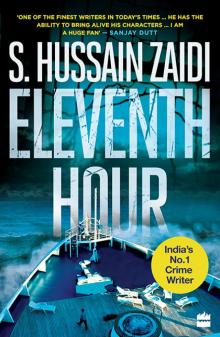 Eleventh Hour
Eleventh Hour